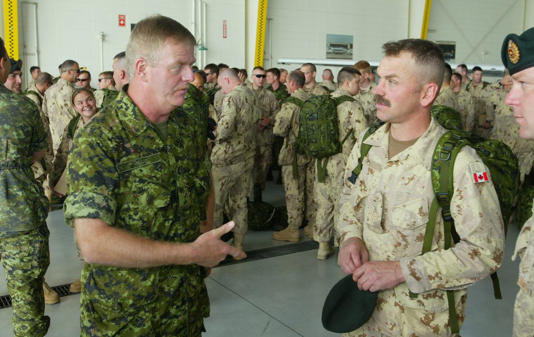
Retired general Rick Hillier, Canada’s former chief of defence staff, says he believes the country risks facing “irrelevance” in an unstable geopolitical world.
In an interview on The West Block, host Mercedes Stephenson asked Hillier what he thought Canada’s biggest national security risk is amid the war in Ukraine entering its third year, conflict in the Middle East and aggression from China, Russia and Iran.
“Our irrelevance. The fact that nobody even bothers to phone us if they’re talking about doing something as a group of Three Eyes or a group of Five Eyes or things of that nature,” Hillier said.
“All those things you described are very real geopolitical and strategic threats and they can destabilize the world even more than it is now. And when the world is destabilized, it’s bad for Canada.”
His comments come as the prospect of a second Donald Trump presidency casts doubt on the future American role in NATO, with Trump suggesting the U.S. wouldn’t defend partner nations that don’t meet the two per cent of GDP spending target.
Canada’s current NATO contributions are about 1.38 per cent of GDP.
In an interview on The West Block last week, Defence Minister Bill Blair said he is confident the U.S. will maintain NATO commitments but could not give a date on when Canada will hit the two per cent target.
The Washington Post reported last year that Prime Minister Justin Trudeau had privately told NATO officials Canada would never hit the military alliance’s spending target.
Video: The West Block: Feb. 18, 2024 | How should Canada respond to Trump’s NATO threats?
“The way we are progressing right now, irrelevance in the international scene, I think is the greatest threat to Canada and I think we can change it in a variety of ways, but we have to have the leadership focus on it and do it,” Hillier said.
Hillier says the short-term solution is a significant amount of spending to update military equipment.
Blair has said he is pushing for more defence spending, and the long-promised defence policy update is being tied to ongoing budget deliberations ahead of the 2024-25 fiscal plan.
As for the current state of the Canadian Armed Forces, Hillier says he feels sorry for people currently serving.
“Their equipment has been relegated to sort of broken equipment parked by the fence. Our fighting ships are on limitations to the speed that they can sail or the waves that they can sail in. Our aircraft, until they’re replaced, they’re old and sort of not in that kind of fight anymore. And so, I feel sorry for the men and women who are serving there right now,” Hillier said.
“I am so thankful that we still have them, and I hope that there are better days ahead. I think there is some potential of that, but at present, we’re in a world of hurt.”
As the war in Ukraine enters its third year, Hillier says that nation is now more vulnerable than it has been in the last two years as western support shows signs of waning.
Source: Global News
